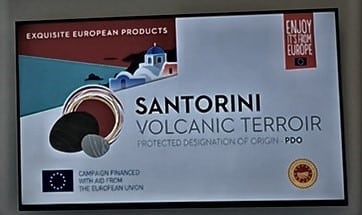Introduction: Discovering Greek Wines – A Palate Adventure
In this 4-part series, “Greek Wines. Small-Scale + Large Impact,” we look at why Greek wines should be on your radar.
Indigenous Grape Varieties: Greece boasts over 300 indigenous grapes, each with its own distinct flavors and characteristics. This impressive diversity allows wine lovers to explore a wide range of grape expressions that showcase Greece’s rich viticultural heritage. From the crisp and mineral-driven Assyrtiko to the aromatic and floral Moschofilero, there is a Greek wine to suit every palate. Exploring these indigenous varieties is like embarking on a voyage through Greece’s terroir and culture.
Distinctive Terroir: Greece’s diverse climate, abundant sunshine, and unique soil composition contribute to the exceptional quality of its wines. The sunny and dry climate allows grapes to fully ripen, resulting in concentrated flavors and vibrant acidity. The thin and poor soil, often found in mountainous regions, forces the vines to struggle, producing lower yields but grapes of exceptional quality. This combination of factors creates wines with complexity, depth, and a strong sense of place.
Captivating White Wines: Greek white wines have gained international recognition for their outstanding quality and distinct character. Assyrtiko, primarily grown in Santorini, produces bone-dry wines with high acidity, pronounced minerality, and refreshing citrus flavors. Malagousia and Moschofilero offer aromatic profiles with floral notes and hints of exotic fruits. These white wines are versatile and pair well with various cuisines, making them a delightful addition to any wine collection.
Expressive Red Wines: Greek red wines, particularly Xinomavro and Agiorgitiko, have also garnered attention for their depth and complexity. Xinomavro, often compared to Italy’s Nebbiolo, produces age-worthy reds with firm tannins, vibrant acidity, and flavors of dark fruits, spices, and earth. Agiorgitiko, known as the “Blood of Hercules” delivers elegant and medium-bodied wines with red fruit flavors and silky tannins. These red wines offer a unique twist on classic grape varieties and provide a compelling experience for wine enthusiasts.
Food-Friendly Styles: Greek wines are known for their food-friendliness and their ability to beautifully complement the country’s cuisine. With its emphasis on fresh ingredients, aromatic herbs, and vibrant flavors, Greek cuisine pairs exceptionally well with Greek wines. Whether you’re enjoying a seafood feast with a crisp Assyrtiko, pairing a lamb dish with a bold Xinomavro, or savoring Greek meze with a versatile Agiorgitiko, Greek wines elevate the dining experience and create harmonious pairings.

Santorini. When a Volcano is a Blessing
The Greek wine journey extends to the captivating region of Santorini, where the ancient Greek god Dionysus is said to have originated. Santorini is steeped in ancient mythology and shaped by a cataclysmic volcanic eruption that occurred in 1620 BCE predating the destruction of Pompeii.
Assets
While it was a catastrophic event, it laid the foundation for a terroir like no other, one that bestows an unparalleled character upon the wines of Santorini. The volcanic ash, pumice stone, solidified lava, and sand that blanketed the island formed the unique Santorini soil, known as aspa (Nykteri style blend of Assyritko with smaller amounts of Althiri and Aidani). The mineral-rich soil, extending to a depth of 100-130 feet, contains all essential minerals except potassium, contributing to the distinctive flavors and aromas found in Santorini wines.
Remarkably, the high sand composition of the soil, ranging from 93 to 97 percent, offers natural protection against phylloxera, eliminating the need for grafting the vines onto rootstock. This natural immunity has allowed the vineyards of Santorini to thrive, with their un-grafted vines delving deep into the nutrient-rich earth.
The Mediterranean climate further shapes the viticultural landscape of Santorini. With mild winters, hot summers, and scant rainfall of approximately 14 inches per year, the vines have adapted to the dry conditions. The porous pumice stones, abundant in the soil, act as reservoirs, retaining precious water for the vines’ sustenance. This unique combination of climate and soil prevents the development of mold and diseases, reducing the need for chemical treatments. Many vintners in Santorini embrace organic practices, resulting in wines that reflect a commitment to sustainability and respect for the land.
To shield the vines from the island’s gusty winds, vine growers employ a clever technique. They utilize low-slung, round koulouri, resembling baskets, which shelter the vines and help create a microclimate conducive to grape ripening. This innovative approach, passed down through generations, adds yet another layer of distinction to the winemaking process in Santorini.
The result of this extraordinary terroir, combined with the influence of the nearby sea air, is the production of exceptional wines that embody the essence of Santorini. From crisp Assyrtiko with its zesty acidity and mineral backbone to the elegant expressions of Chardonnay, Sauvignon Blanc, and Syrah.
Winemaker Challenges
Santorini, with its fragile viniculture industry, faces challenges due to its volcanic soils and sparse nutriments. The vineyards on the island are widely spaced to maximize access to these limited resources. Over the years, the vineyard area has significantly decreased. In the 1960s, there were more than 4,000 hectares of vineyards, but by 1980, it was reduced to half that size. Currently, there are only 1,100 hectares of vineyard remaining, supplying 21 wineries, and this number continues to decline each year.
The principal grape variety on Santorini is Assyrtiko, which accounts for 80 percent of the vines. Other indigenous varieties are also grown, including Athiri and Aidani, as well as a few hundred hectares of Syrah and local red grapes. Assyrtiko, in particular, is known for producing powerful, full-bodied wines with a high alcohol content of up to 15 percent. These wines are characterized by their acidity, minerality; nuts, smoke, and butter, are bone-dry, and have a distinct citrus aroma.
Additionally, Santorini is known for its dessert wines called “Vinsanto,” a name derived from Santorini itself. Vinsanto can be naturally sweet or fortified and must be aged in oak barrels for a minimum of two years. It is renowned for its velvety palate and exhibits aromas of crème brûlée, chocolate, and dried apricots.
Wine Notes
1. Santo Vinsanto 2008. Assyrtiko 85 percent. Aidani 15 percent. Naturally sweet wine from sun-dried grapes; 6 years in 225L 4th and 5th use oak barrels.
Santo Wines
The Union of Santorini Cooperatives is an organization that has been operating since 1947 and represents a large number of active members. The mission is to safeguard the local traditional cultivations and promote sustainable agriculture development.
The focus on producing high-quality Protected Designation of Origin (PDO) Santorini wines and products is important for preserving the unique characteristics of the region’s agricultural offerings. By promoting sustainable practices, the organization ensures that the local cultivations can thrive while minimizing negative impacts on the environment.
The emphasis on biodiversity through a nursery of autochthonous varieties is particularly noteworthy. By preserving and cultivating local grape varieties, the Cooperative contributes to the preservation of the island’s viticultural heritage. Additionally, the nursery serves as a base for studying and trialing the cultivation of local grapes, which can lead to further advancements in viticulture on the island.
Wines to Consider
About the Grapes
Assyrtiko
Assyrtiko is a white grape variety native to Santorini. It is among the most famous and distinctive grapes and associated with:
• Acidity. Provides wines with a refreshing and crisp character; adds vibrancy and liveliness to the wine.
• Aroma. Presents a complex aromatic profile including citrus fruits (lemons, grapefruits), green apples, pears, and tropical fruits complemented by mineral and saline notes, characteristic of the volcanic soils of Santorini.
• Structure. Medium to full body delivers rich and textural mouthfeel and allows for extended aging potential.
• Aging. Able to age, gracefully developing pronounced secondary aromas, including honey, dried fruits, and nuts.
• Versatility. Can be used to produce a range of wine styles; commonly used to make dry white wines known for vibrant acidity and mineral character. Can be used to produce sweet and dessert wines, where high acidity helps to balance the sweetness.
• Adaptability. Vineyards often face harsh growing conditions, including strong winds and limited rainfall. This variety has adapted to these conditions and has the ability to retain acidity while achieving full ripeness.
Aidani
• Acidity. Moderate to high acidity contributes to freshness and balance.
• Aroma. Produces wines with aromatic profiles characterized by floral and fruity notes; think white flowers, citrus fruits, tropical fruits, and herbs.
• Body and Texture. Usually light to medium bodies with a smooth/silky texture.
• Versatility. Commonly used in blends with other grape varieties such as Assyrtiko to add complexity and enhance overall flavor profiles.
• Sweet wines. In some regions, the grapes are used to produce sweet wines as the naturally high acidity helps to balance the sweetness delivering a well-balanced dessert wine.
• Regional variations. Flavor profiles can vary depending on the growing region. Different terroirs, climate conditions, and winemaking techniques will influence the final characteristics.
The Wines
1. Santo Vinsanto 2008. Assyrtiko 85 percent, Aidani 15 percent.
This dessert wine is made from sun-dried grapes, specifically from the Santorini region. The winemaking process involves the sun-drying of the grapes on terraces for 6-8 days, followed by fermentation in stainless steel tanks, and extended maturation of 6 years in oak barrels, indicating a meticulous approach to crafting this unique wine.
The prolonged aging in oak barrels contributes to the mellow and velvety character of the wine, while also allowing it to develop a harmonious balance of honey and lemon notes. The deep orange-red color with hints of brown suggests maturity and richness, indicating that the wine has undergone significant aging.
The aroma profile of this dessert wine is complex and enticing. It offers a range of scents, including sweet spices like cinnamon and cloves, as well as dried fruits such as figs, prunes, apricots, and black raisins. These aromas add depth and richness to the wine, enhancing the overall experience.
On the palate, expect a round, velvet, and rich texture, which is characteristic of well-aged dessert wines. The flavors are a mix of sweetness and citrus, providing a delightful contrast that adds complexity to the wine’s taste profile.
To fully appreciate this dessert wine, it is recommended to serve it at a temperature of 12 degrees Celsius. It can be enjoyed as an aperitif or paired with dried nuts, which can complement the wine’s flavors and provide a delightful sensory experience.
Overall, this Santorini dessert wine showcases the result of meticulous winemaking and an extended aging process. Its mellow and velvety character, balanced notes of honey and lemon, and complex aroma and flavor profile make it a wonderful choice for those who appreciate the richness and depth of well-aged wines.
2. Estate Argyros Cuvee Monsignori 2020. Assyrtiko 100 percent; producing an organically farmed, dry white wine; using vines from the Episkopi vineyard’ the oldest vineyard in Santorini, which has been nurtured and cultivated by the Argyros Estate for over two centuries. Aged in stainless steel, 11 months sur lie. Over 200 years of cultivation by Argyros family. Fermented, partially uninoculated in stainless steel at cool temperatures and aged for 10 months in stainless steel tanks on fine lees. Remains 4 years in the bottle.
Monsignori is derived from the Venetian term Mon Signor (The Master), highlighting the expertise and mastery of the family in winemaking. Mules are used for cultivation and only the finest grapes are harvested. The process follows the traditional techniques while incorporating modern advancements.
Notes
Pale lemon-green color greets the eye. The aromas include notes of lemon, grapefruit, orange peel, green apple, honey, and peach, complemented by a pleasant minerality (associated with stones and linked to the soil). When tasted, the wine provides a rich and captivating experience, leaving a strong positive and lasting impression. Pair with white meats in lemon sauce, shellfish, and eggplant dishes.
© Dr. Elinor Garely. This copyright article, including photos, may not be reproduced without written permission from the author.
Read Part 1 here: Wine! Greek For Me
Read Part 2 here: Economics of Greek Wine Industry
Read Part 3 here: Attica Wine Region: Sophisticated and Classic























